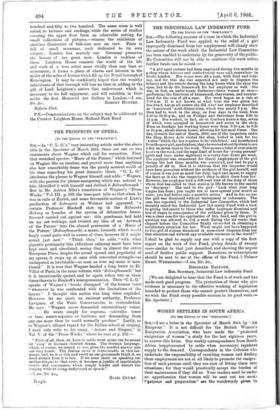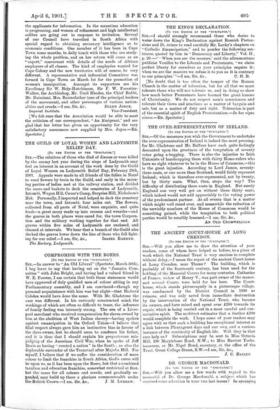WOMEN SETTLERS IN SOUTH AFRICA. [To THE Enrroa OF THE
“sriccrAroa.".1 see a letter in the Spectator of March 30th by "n Emigrant." It is not difficult for the British Women's Emigration Association, who have made the "protected emigration of women" a study for the last eighteen years, to answer this letter. Our weekly correspondence from South Africa (supplemented by cable when necessary) regulates supply to the demand. Correspondents in the colonies who undertake the responsibility of receiving women and finding them employment are not at all likely to promote the emigra- tion of such persons until they are sure of fitting them into situations; for they would practically accept the burden of their maintenance if they did so. Your readers need be wader no apprehension that women will be sent out too won: 'patience and preparation" are the watchwords given to the applicants for information. In the meantime education is progressing, and women of refinement and high intellectual calibre are going out in response to invitation. Several of our Council have travelled in South Africa with special regard to obtaining necessary intelligence as to economic conditions. One member of it has been in Cape Town some months, in daily touch with those who are study- ing the whole problem, and on her return will come as an "expert," conversant with details of the needs of African employers of all classes. The kind of employes wanted for Cape Colony and the new territories will, of course, be very different. A representative and influential Committee was formed in Cape Town on March 1st for the promotion of women's immigration. Amongst its supporters are his Excellency Sir W. Hely-Hutchinson, Sir F. W. Forestier- Walker, the Archbishop, Mr. Cecil Rhodes, the Chief Rabbi, Mr. Buissinne, Mrs. Bairnsfather (one of the principal leaders of the movement), and other personages of various nation- alities and creeds.—I am, Sir, &c., ELLEN JOYCE, Imperial Institute. Vice-President, [We felt sure that the Association would be able to meet the criticism of our correspondent, "An Emigrant," and are glad that her letter has given an opportunity for the very satisfactory assurances now supplied by Mrs. Joyce.—En.
Spectator.)







































 Previous page
Previous page